There is no letter this time. I am posting several newspaper articles mailed home about various Negro History Week activities in Springfield, Massachusetts in February, 1946. Included are some articles I found at GenealogyBank.I thought I would post them as African American History Month draws to a close. Something not covered by newspaper article is that there were only six more months until I arrived on the scene!
Heroic Infantryman
Fifty uniformed members of the new Crispus Attucks post, VFW, attended a memorial service for Pfc Carl L. Talbot yesterday morning at the St. John’s Congregational church. The service for Talbot, who died as the result of wounds received in Italy with the 355th infantry regiment, 92nd division, was also attended by his mother, Mrs. Z. Carl Talbot of New York city, and his widow, Mrs Georgia Mae Talbot, also of New York.
Before a congregation, which filled the pews and extra chairs, Richard H. Snyder, Jr., post commander, presented the mother of the soldier a Gold Star certificate and bouquet, and the widow a Bible bearing the post’s name and a reading by its chaplain, John Cranshaw.
A memorial sermon was preached by the pastor, Rev Albert Cleage, and Comdr Snyder made a memorial address.
_____________________
____________________________________________
Chapel of Air Lists Events
Special programs will be presented observance of Negro history week, which starts today, and Brotherhood month over the chapel of the Air program sponsored by the Greater Springfield Council of Churches.
Tomorrow and Tuesday members of the international seminar, meeting here at Hope Congregational church, will speak. They are Rev Sabapathy Julandran, Chaplain Gernanda Laxamana and Miss Manawora Powar of India.
Rev Albert B. Cleage, pastor of St. John’s church will be speaker for the balance of the week. His topics will be “The Christian Dilemma” on Wednesday; “Pigmies and Supermen” on Thursday; and “Hope vs Reason” on Friday. The program is scheduled at 1:30 over WSPR. (Schedule transcribed from The Springfield Sunday Union and Republican. February 10 1946)
Civil War Called Economic Contest
George W. Goodman Asserts It was Fought Because Slave and Free Economies Were Opposed
The Civil War was not fought for the emancipation of the Negro but was a contest between two economic theories – slave economy and free economy – with the Negro as the scapegoat, was the declaration made by George W. Goodman, director of the North End Interracial Community Center in Hartford, in his talk last night at the observance of Negro history week conducted by the Springfield branch National Association for the Advancement of Colored People at St. John’s Congregational church.
Fluently expressing his thoughts on his topic of “Democracy at the Crossroads,” Mr. Goodman further declared that the present-day racial troubles in this country are not accidental but the result of an accumulation of negative attitudes and differences throughout the 300 years of this country’s existence.
Emphasizing that America must face squarely the matter of justice and equality for all men as being a basic moral issue, the speaker added “We’ve been talking democracy for about 200 years but we haven’t come close to actually applying it.”
Citing his experiences while a Red Cross worker for two years in England, Mr. Goodman said that the English people showed unreserved friendship to American Negro soldiers due to the friendly attitude and sense of humor the colored soldier displayed.
A part of the meeting featured the awarding of merit certificates issued by the national office of the NAACP in New York to eight members of the local unit who had been instrumental in increasing the membership during the campaign last year. The presentations were made by Rev. Albert Cleage, pastor of St. John’s church. Miss Marguerite Carson, president of the Springfield branch, was chairman of the meeting.(Transcribed from The Springfield Daily Republican, Springfield, Mass, Thursday, February 14, 1946)
“In a combination of choral speaking, music and plain speech, a program of Negro folklore called “The Negro Speaks” was presented at the YWCA last night. In three movements which took almost two hours, the speech choir, soloists, quartet, speakers presented a rhythmic, sibilant tone and word picture of the progress of the Negro from slavery to the present.”
“Choral speaking is the oral interpretation of verse possessing many of the qualities of the Negro spiritual. The speech choir was led by Langston Hughes. Soloist was Carol Somerville and the quartet was composed of Constance Taylor, Joanne Wilson, James Herbert and William Barnett. Speakers were William Woods, Isiah Hill, John Carter and Marguerite Carson. Other singers were Clarence Calloway, James W. Johnson and J.R. Johnson, Frances Jones accompanied.”
Members of the speech choir were Alfreda Desmond, Myrtle Desmond, Edith fuller, William B. Hill, Malcolm Lasseter, Nile Pettijohn, Joan Carole Porter, Charles Wiley, Willa Mae Porter, Lindbergh Pulley, Barbara Seymour, James Spruill, Alberta Walker, Dorothy Walker, Rodman Ware, Alfred B. Wimbish and W. Orrin Woods.
The program was a part of Negro history week which ends today. Opening remarks were made by Mrs William A. Lawrence.
According to The History of St. John’s congregational Church, published in 1966 “He (Albert B. Cleage) also wrote dramas; one of them coauthored with four other recalled ‘eighty years of progress’ since Emancipation and “the significant role the Negro played in our country’s history.'”

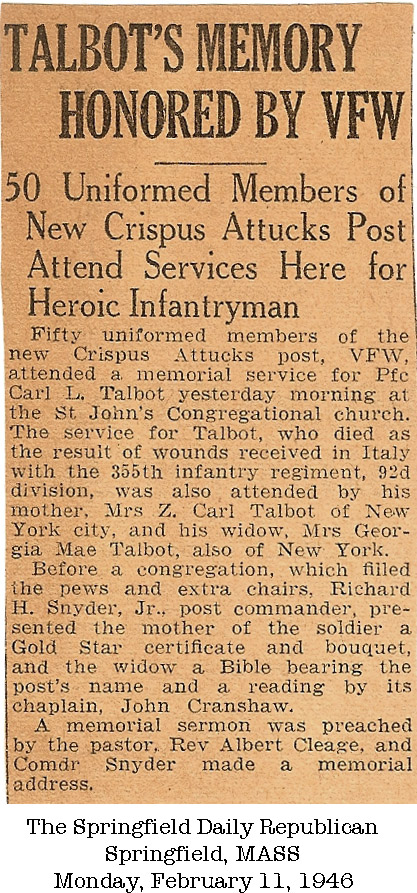
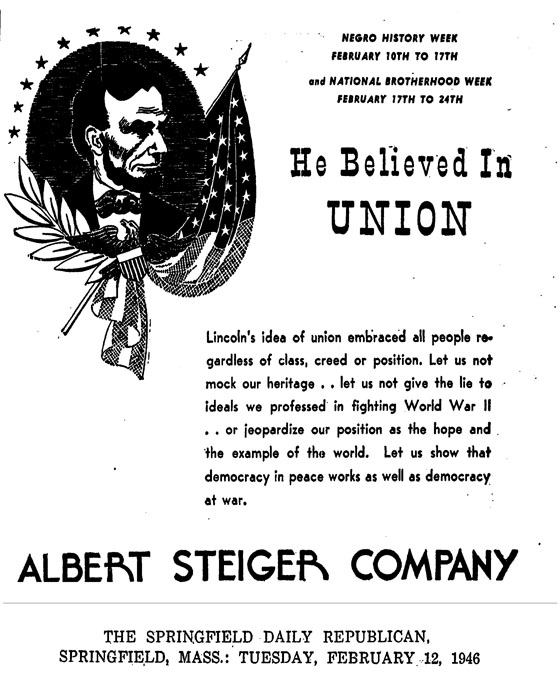
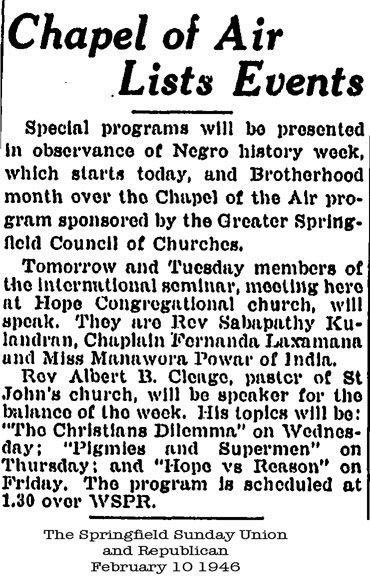
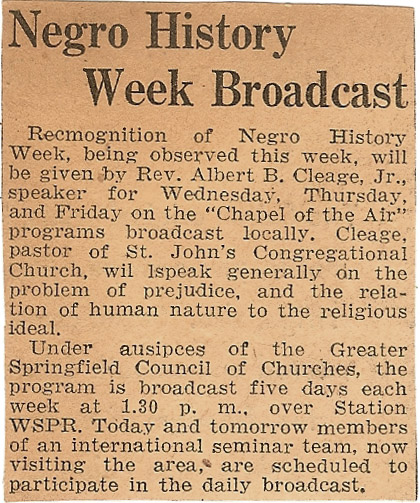
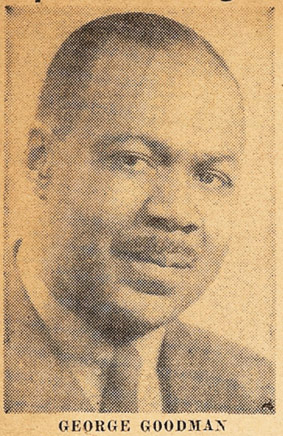
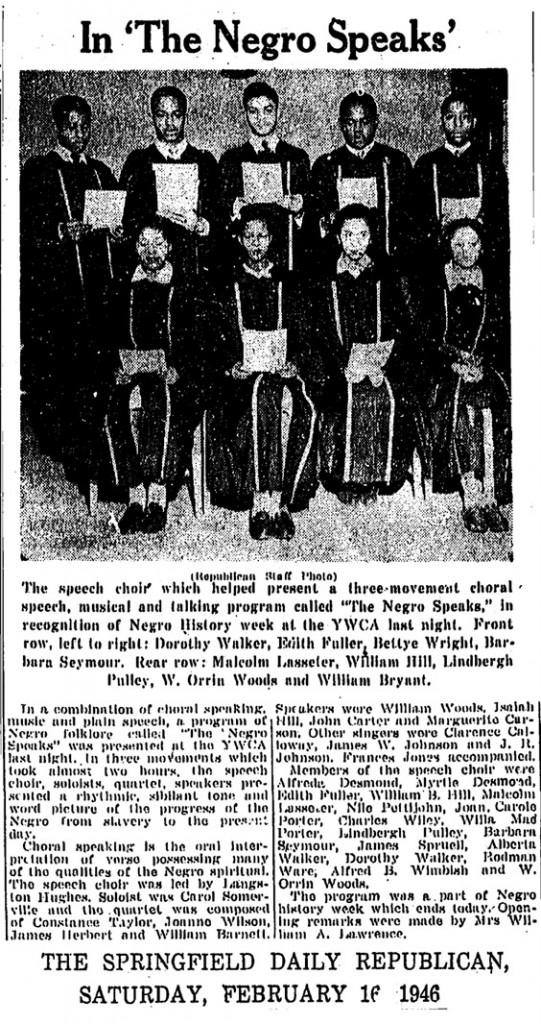

Wow! I’m impressed that the Speech Choir was led by Langston Hughes!
Okay — Help me out here — I know the name Langston Hughes — I just can’t remember why. I know it’s a famous name, but I need my memory refreshed. After all, I am 78 now — so it’s allowable to not remember stuff, right?
Peace …
He was a famous black poet. Here’s a link to a brief bio http://www.poemhunter.com/langston-hughes/biography/
The program and other original documents really bring this post alive. It also makes me think about whether I should be saving these types of materials from events I participate in. I was recently picking up–and threw out a handful of memorabilia from events I’d recently attended. Now I’m second guessing myself. It’s really hard to find the right balance between saving and tossing. . .
That is so true Sheryl! I’ve saved a lot and tossed some out. I’m thinking that I should save in one of my many blank books and write at least a sentence about the event. Thinking I should check the trash for something I threw out a few days ago and save with a write up.
I really enjoyed this post! Very informative! Wow!! Langston Hughes!!!
I remember my mother talking about meeting him but I didn’t get her to write it down and my sister and I can’t remember the particulars. We grew up with copies of most of his works in the house.
Fascinating post – thank you !
Would you happen to have any more articles on the Talbots who I descend from?
I’m sorry Martha, I don’t have any other articles mentioning them.